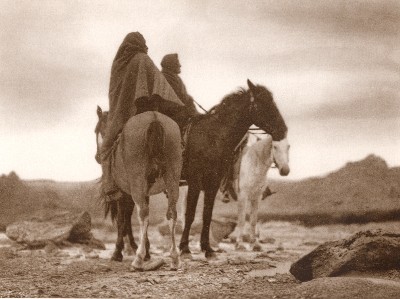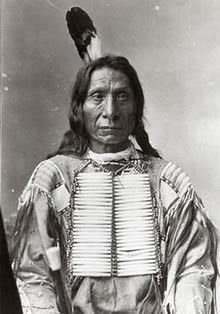
To this day, the Black Hills of South
Dakota are still sacred mountains to the Sioux, who were recognized
in the treaty of 1868 at Fort Laramie as the owners of these
mountains 'for as long as the grass shall grow and the rivers will
flow." A few years later, in 1874, George Custer's breached
that treaty by marching a thousand men into the Black Hills and
declaring to the embedded press, "There's gold in them thar
hills!" Within a year, white men were mounting a stampede to
the Black Hills. Towns like Deadwood grew up overnight.

Chief Red Cloud
asked the U.S. government to begin enforcing the treaty provisions
signed at Fort Laramie in 1868 and to run the miners off, but the
miners turned the tables by asking the government to evict the
Sioux.
click here for more
The government offered to buy
the Black Hills from the Sioux for $6 million, but the Sioux turned
them down. Red Cloud asked for $60 million and the government
refused to pay. President Grant then issued an order that all
Sioux bands must come into their assigned agencies by January 31,
1876, or be considered hostile and treated accordingly. This
was a double indemnity for the Indians. The government was
not only refusing to honor its pledge made in treaties, it was also
threatening to force the nomads onto small reservations.
The Sioux's
defiance of Grant's order led to the great conference of western
tribes at the Little Big Horn River, on the Greasy Grass, in June
of 1876, where they would vanquish George Custer's regiment of the
7th Cavalry on June 25.

An artist's depiction of Custer's Last Stand at the
battle of the Little Big Horn
In the 20th century,
the Sioux sued the federal government for failing to honor its
treaty obligations in 1868. The case took decades to resolve,
but it was finally settled in 1978 by the U.S. Supreme Court, which
found in favor of the Sioux. Money was set aside as
compensation for the theft of their sacred homelands, but they have
never touched those funds, which for thirty years have been
gathering interest in the U.S. treasury.